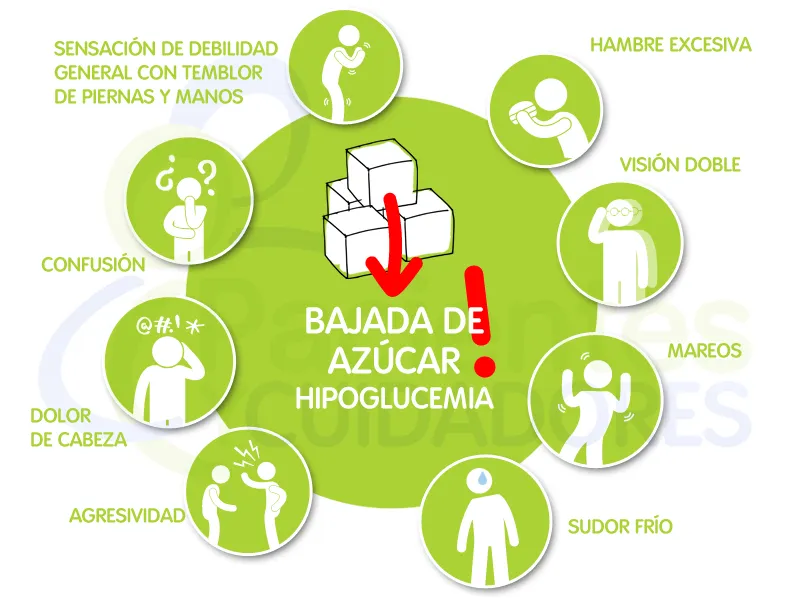Part of what involves living with diabetes is learning to deal with some of the problems that this disease brings.Hypoglycemia, or low blood sugar level is one of those problems.All people suffering from diabetes suffer from hypoglycemia occasionally.
Hypoglycemia, sometimes called insulin reaction, may even appear in which we do everything within our reach to control diabetes.Therefore, although many times we cannot avoid it, it is possible to treat hypoglycemia (low blood sugar level) before it gets worse.For that reason, it is important to know what hypoglycemia is, what are the symptoms and how to treat it.
What are the symptoms of hypoglycemia?
The symptoms of hypoglycemia are included:
* Tremors
* Dizziness
* sweating
* hunger
* headache
* paleness
* Sudden irritability or changes in behavior, such as crying without apparent cause
* clumsy or spasmodic movements
* Seizures
* Difficulty paying attention, or confusion
* Sensation of tingling around the mouth
How do we realize when the blood sugar level is low?
Part of the task of maintaining diabetes under control is frequently measuring blood sugar level.See with your doctor how often you should measure your blood sugar levels and which ones should be.If the blood control results indicate that the sugar level is low, it is necessary to treat that problem.
You must measure the glycemia level at the hours your doctor has indicated.And, what is even more important, you must measure the level of glycemia every time you feel that you are going down.Once you have measured and proven that the blood sugar level is low, it is important that hypoglycemia treats as soon as possible.
If you have the feeling that a reaction is approaching but you cannot measure the sugar level, it is convenient to treat the reaction instead of waiting.Remember this simple rule: in doubt, act.
How is hypoglycemia about?
The fastest way to increase blood sugar level and treat hypoglycemia is with some kind of sugar, such as 3 glucose tablets (they are sold in pharmacies), 1/2 fruit juice rate or 5- 5-6 hard caramel pieces.
Consult with the health professional who attends or your dietitian to elaborate a list of foods that you can ingest to treat the low level of blood sugar.Then, be sure to always carry at least one class of sugar.
After measuring blood sugar and treating hypoglycemia, wait 15 or 20 minutes and measure the blood sugar level again.If the blood glucose level still continues and the symptoms of hypoglycemia do not disappear, repeat the treatment.When you feel better, continue consuming the usual meals and snacks as planned, to keep the blood sugar level high.
It is important to treat hypoglycemia immediately since it can worsen and causes the loss of knowledge.If you suffer a fainting, you will need immediate treatment, such as a glucagon injection or emergency treatment in a hospital.
Glucagon increases blood sugar level and is injected as insulin.Consult your doctor to extend a glucagon recipe and explain how to use it.It is essential that you teach people around your family and co -workers) how and when to inject glucagon, in case you ever need it.
If it were not possible to get glucagon, they must transfer it to the nearest emergency room to receive treatment by low sugar level inblood.If you need immediate medical attention or an ambulance, someone should call the emergency number of your area (such as 911) to request help.It is convenient to have emergency numbers next to the phone.
If you lose knowledge as a consequence of hypoglycemia, the person who attends must follow these indications:
* Do not inject insulin
* Do not give food or liquids
* Do not put your hands in your mouth
* Do not inject glucagon
* Call the emergency number to request help
How is the low level of blood sugar prevented?
The best way we know to prevent hypoglycemia is the good control of diabetes.The key is to learn to recognize the symptoms of hypoglycemia.In this way, you can treat hypoglycemia before it gets worse.
Ignorance about hypoglycemia
Some people do not manifest any symptoms when they have hypoglycemia.They can lose knowledge without having noticed that their sugar levels were decreasing.This problem is called "ignorance about hypoglycemia."
Ignorance about hypoglycemia usually happens to people who have suffered diabetes for many years, and it is not something that happens to all.It is more common among people suffering from some neuropathy (nervous damage), people who carry a rigorous control of diabetes and those who take certain medications for the heart or for high blood pressure.
Over the years, although many people continue to have hypoglycemia symptoms, symptoms change.In that case, you can fall into the error of not recognizing a reaction because the sensation is different.
These changes constitute a good reason to control the level of glycemia frequently and to put your family and friends about the symptoms of hypoglycemia.Even when you feel good, it is important that you treat low or descent blood sugar levels.And if on some occasion the blood glucose levels descend less than 50 mg/dl and have no symptoms, consult the team of professionals who attends it.






